Tillie K. Lubin Symposium
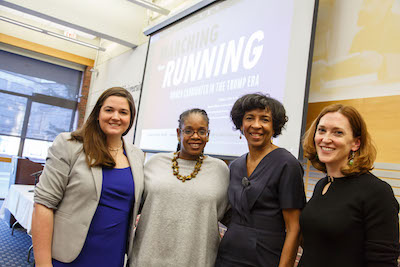 Ryanne Olsen, Glynda C. Carr, Charlotte Golar Richie and Jill S. Greenlee, speakers at the 2018 Tillie K. Lubin Symposium
Ryanne Olsen, Glynda C. Carr, Charlotte Golar Richie and Jill S. Greenlee, speakers at the 2018 Tillie K. Lubin Symposium
The Tillie K. Lubin Symposium focuses on a contemporary issue or event relevant to Women’s, Gender and Sexuality Studies.
It was started in honor of Tillie Kulp, a native of Iowa, who married Charles Lubin in the late 1930s soon after he had purchased a chain of neighborhood bakeries in Chicago. After the birth of their daughter Sara Lee, the Lubins renamed their company the Kitchens of Sara Lee.
The company's great success allowed the Lubins to engage in many philanthropic projects. Among their major gifts, they established the Charles Lubin Family Chair for Women in Science at Skidmore College and the Charles W. and Tillie K. Lubin Center for Plant Biotechnology and the Lubin Chair of Hormone Research at the Weizmann Institute of Science. Tillie Lubin also had a lifelong passion for the arts and a particular affinity for Spanish culture. Her daughter, Sara Lee Schupf, served on the Women's Studies Program Board in the 1990s and endowed the Lubin Symposium in her mother's honor.
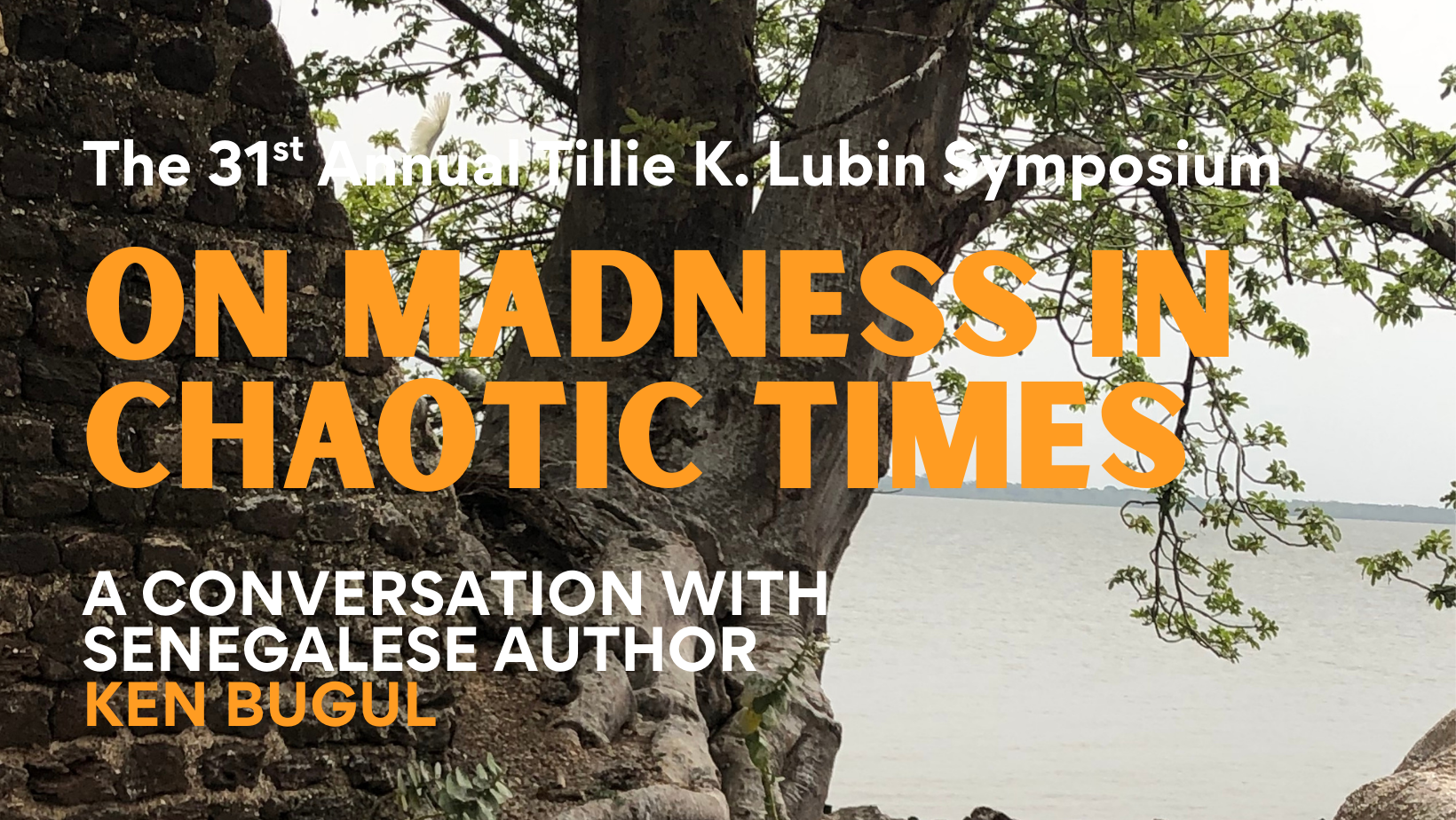
"On Madness in Chaotic Times: A Conversation with Senegalese Novelist Ken Bugul."
Wednesday, October 15, 2025
3:00-5:00PM
Mandel Center for the Humanities, Brandeis University
Madness is a main trope in Ken Bugul’s fiction. It is an aesthetic form that allows the author to depict African and Caribbean women in quest of epistemological ruptures. Madness, in Ken Bugul’s novels, is a sociopolitical critique of normalized violence. She is in many ways different from her contemporaries because she intentionally disrupts Senegalese cultural codes of decorum and propriety- specially the three cardinal values of kersa, sutura, muñ - inculcated in all children… and valued in young women. Her overt, unembarrassed, and unapologetic representation of gendered violence and its intersections with race, colonialism, and postcolonial violence, has contributed to carving out a space for Senegalese women writers to write openly about issues that have long been veiled by silence.
Professor Emilie Diouf will facilitate a conversation on madness and errantry in Ken Bugul’s fiction to help us understand how the writer uses these tropes to create a capacious space for articulating feminist politics and strategies of resistance that are often overlooked in African and Black feminist scholarship. During a conversation with young feminist activists during the women writer’s festival in Dakar in May 2022, Ken Bugul referred to a feminist practice of “dof dof lu ba jáll” (wolof for faking madness to be left alone). For Ken Bugul, madness is both a theoretical framework and practice through which one negotiates the suppression of voice and agency that African women often experience on the continent and in Transnational feminist spaces.
Featured Speaker and Panelists
Ken Bugul / Mariètou Mbaye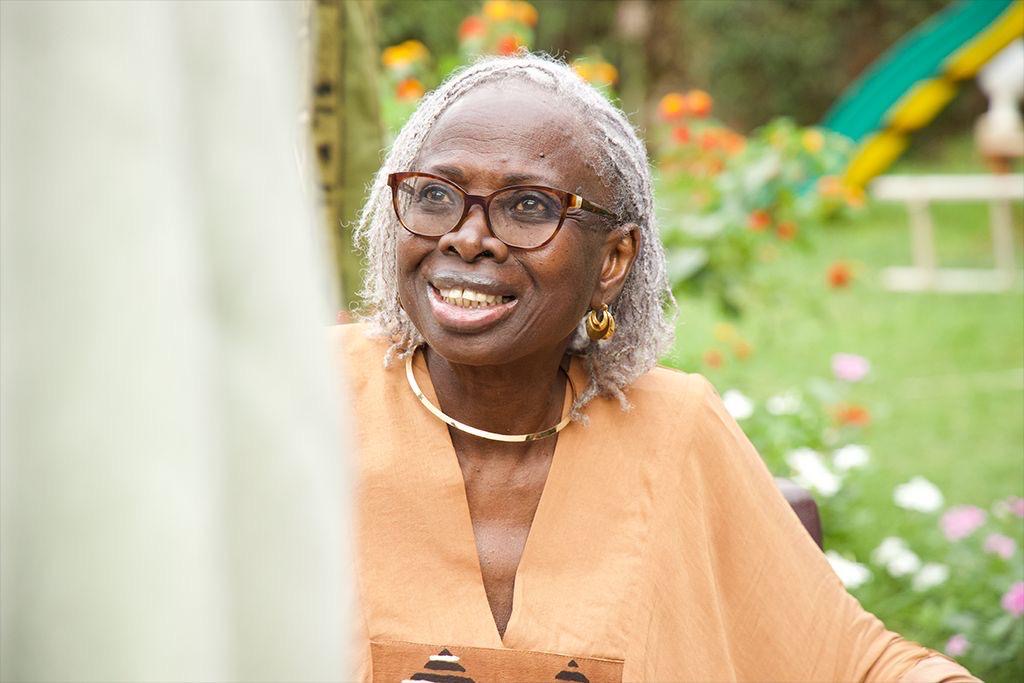
Mariètou Mbaye chose to adopt the pen name Ken Bugul, which means the one nobody wants, in Wolof. She is an internationally acclaimed Senegalese novelist with 11 novels. Le Baobab fou (1982) -in English, The Abandoned Baobab (University of Virginia Press, 2008) - marked her entry into World literature. The novel has been translated into several languages and has been characterized as a feminist manifesto. It is a canonical text in Francophone African Literature. Ken Bugul’s novels are introspective and center around questions of gender, sexuality, madness, African spiritualities, indigenous approaches to healing, ecology and urban development, race and migration. Ken Bugul is also a renowned feminist activist and a fierce advocate for peace. During her keynote at the first edition of Le salon du livre féminin de Dakar (women writer’s book fair) in May 2022, Ken Bugul referred to a feminist practice of “dof dof lu ba jáll” (wolof for faking madness to be left alone). For Ken Bugul, madness is both a theoretical framework and practice through which one negotiates the suppression of voice and agency that African women often experience on the continent and in Transnational feminist spaces.
Novels by Ken Bugul:
Le Baobab Fou. Presence Africaine, Paris, 1982 translated as The Abandoned Baobab : The
Autobiography of a Senegalese Woman. 1st ed., Lawrence Hill Books, 199
Cendres et braises. L´Harmattan, Paris, 1994
Riwan ou le chemin de sable. Présence Africaine, Paris, 1999
La folie et la mort. Présence Africaine. Paris, 2000
Rue Félix-Faure. Le Serpent à Plumes. Paris, 2003
De l’autre côté du regard. Le Serpent à Plumes, Paris, 2003
La pièce d’or. Ubu, Paris, 2003
Mes hommes à moi. Presence Africaine Paris, 2008
Aller et retour. Les Éditions et Diffusion Athéna, 2013.
Le trio bleu. Presence Africaine, Paris, 2022
“Réparer le passé.” Hybrida, no. 10, 2025, https://doi.org/10.7203/HYBRIDA.10.31264.
Professor Marame Guèye
Marame Guèye is a Professor of African and African Diaspora Literature in the Department of
English at East Carolina University where she also serves as Thomas Rivers Distinguished Professor for Global Understanding. Her research is on the verbal art of women, hip hop, and migration. She is also a scholar activist deeply engaged in the feminist organizing in Senegal and its diaspora. Her publications include, “Boubacar Boris Diop’s Un tombeau pour Kinne Gaajo: The Value of Memory, Writing, and Translation”; Urban Guerrilla Poetry: The Movement Y’en a Marre and the Socio-Political Influence of Hip Hop in Senegal”; and “Modern Media and Culture in Senegal: Speaking Truth to Power.” “Ode to Patriarchy: The Fine Line Between Praise and Criticism in a Popular Senegalese Poem”; “Woyyi Ceet: Senegalese Women’s Oral Discourses on Marriage and Womanhood”; and “The Battle of Words: Orature as Women’s Resistance Tool to the Challenges of Polygamy in Contemporary Wolof Society.” Professor Guèye was featured in the African Report as one of the ten African scholars to watch in 2024. She is the recipient of the 2024-2025 Fulbright U.S. Scholars Program, which led her back to teaching at her alma mater, Cheikh Anta Diop University. She is the founder of robust network of over 3,000 Senegalese Women living in the United States.
Professor Odile Cazenave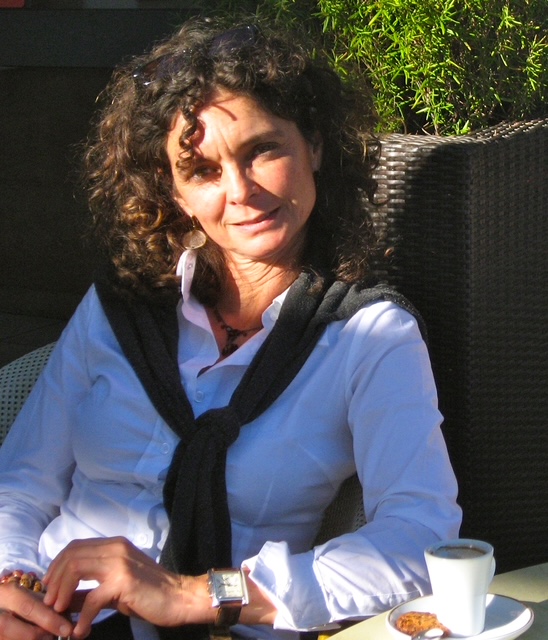
Odile Cazenave is Professor of French Studies in Romance Studies, African Studies, and the
Center for the Study of Europe, and is an Associate Faculty of the Pardee School of Global
Studies at Boston University. Her research interests focus on the writing and reception of
postcolonial literary and filmic narratives in French. Her publications include: Femmes rebelles: naissance d’un nouveau roman africain au féminin (L’Harmattan, Paris 1996) and Afrique sur Seine. Une nouvelle génération de romanciers africains à Paris (L’Harmattan, 2003)–both are available in translation (Rebellious Women (Lynne Rienner, 1999). She is also the author of Afrique sur Seine: A New Generation of African Writers in Paris; (Lexington Books, 2005) and Contemporary Francophone African Writers and the Burden of Commitment (University of Virginia Press, 2011, co-written with Patricia Celerier, Vassar College). She has edited and co-edited a number of special issues for different journals: Présence Francophone 58, ‘Francophonies, Ecritures et Immigration;’ with writer and philosopher, Tanella Boni, Cultures Sud, 172 L’engagement au féminin; with Patricia Célérier, Présence Francophone «Vingt ans après le génocide des Tutsi du
Rwanda : regards sur la production artistique», (PF 85, December 2015) and Nouvelles Etudes
Francophones, (NEF33.1, 2018) on African and Afro-diasporic documentaries. She has written
on a large number of Francophone writers and a wide range of topics related to gender and
sexuality, postmemory, the local and the global, art from trauma, filiation and transmission, the diaspora, as well as issues of displacement, migration, and citizenship in a global world. Her most recent publications include articles on Indian Ocean Literature, film, and globalization. In 2018, Odile Cazenave was named a Chevalier dans l’Ordre des Palmes Académiques.
Professor Émilie Diouf (Moderator)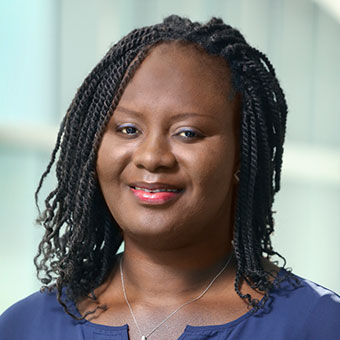
Professor Émilie Diouf is Assistant Professor of English, African and African-American Studies, and Women's, Gender, and Sexuality Studies at Brandeis University. Her research focuses on Anglophone and Francophone African literature; Caribbean literature; critical theory; film/media; gender and sexuality studies; postcolonial theory and literature.
Past Symposia
March 25, 2025
A conversation with Professors J. Jarpa Dawumi (Howard University), Christine Vogt-Williams (University of Bayreuth), and Nemata Blyden (University of Virginia), moderated by Professor Olajumoke Yacob-Haliso (Brandeis University).March 29, 2023
Professor Tiffany Lethabo King (University of Virginia) and Professor Cutcha Risling Baldy (Cal Poly Humboldt) in conversation about what it means to study notions of "gender" and "sexuality" from a decolonial perspective.March 16, 2022
A conversation with Celeste Pedri-Spade (Queens University) and Zoe Todd (Carleton University) introduced by ChaeRan Freeze.
October 6, 2020
Cathy Cohen (University of Chicago) introduced by V Chaudhry.
March 14, 2019
Terese Marie Mailhot introduced by Professor ChaeRan Freeze.
February 26, 2018
Panelists include Glynda C. Carr, Ryanne Olsen and Charlotte Golar Richie with moderator Professor Jill Greenlee.
March 9, 2017
Panelists include Professors Anita Hill, Jeffrey Lenowitz, Eileen McNamara, Susan Parish and Michael Willrich with moderator Professor Jill Greenlee.
March 22, 2016
A conversation with Jasmine Johnson followed by a book signing with Janet Mock.